new posts in all blogs
Viewing: Blog Posts Tagged with: Volunteers, Most Recent at Top [Help]
Results 1 - 25 of 52
How to use this Page
You are viewing the most recent posts tagged with the words: Volunteers in the JacketFlap blog reader. What is a tag? Think of a tag as a keyword or category label. Tags can both help you find posts on JacketFlap.com as well as provide an easy way for you to "remember" and classify posts for later recall. Try adding a tag yourself by clicking "Add a tag" below a post's header. Scroll down through the list of Recent Posts in the left column and click on a post title that sounds interesting. You can view all posts from a specific blog by clicking the Blog name in the right column, or you can click a 'More Posts from this Blog' link in any individual post.
Later this spring our library will be hosting its first ever Volunteer Fair. We are so excited for this event as it brings value to the community and lays the foundation for new partnerships with many local organizations.
 We considered a volunteer fair for our community for several reasons. First, our library is fortunate to be located in a village that is dedicated to civic service and philanthropy. This event is also a great way for us to target and engage two elusive age groups for us– tweens and teens. Finally, a volunteer fair supports one of our library’s missions: “to act as a responsive resource for lifelong learning.” We hope a successful fair will further strengthen the library’s position as a vital center of the community and create lasting partnerships with local organizations.
We considered a volunteer fair for our community for several reasons. First, our library is fortunate to be located in a village that is dedicated to civic service and philanthropy. This event is also a great way for us to target and engage two elusive age groups for us– tweens and teens. Finally, a volunteer fair supports one of our library’s missions: “to act as a responsive resource for lifelong learning.” We hope a successful fair will further strengthen the library’s position as a vital center of the community and create lasting partnerships with local organizations.
Finding and securing participants in the fair has been a great education in the breadth of service opportunities available. If you’re interested in holding a Volunteer Fair, here are a few tips to get you started:
- Begin with existing partnerships. Does the library partner with any other local organizations for programming or outreach efforts? Does your Friends group use volunteers? Does your library display flyers or brochures from organizations that could use volunteers?
- Collaborate with colleagues. Are any coworkers actively volunteering? Or do they have a connection to an organization in need?
- Look at which other organizations are present at community events. Farmer’s Markets and festivals are a great way to make contact and learn about other local organizations.
- Research national organizations that may have a local chapter nearby in need of volunteers. These can include: American Heart Association, American Cancer Society, American Red Cross, Alzheimer’s Foundation, National Multiple Sclerosis Society and many others.
- Perform an online search to see what opportunities are available in your area and contact those organizations directly about your event. Websites like volunteermatch.org and createthegood.org are a good place to start. Also your community’s website may list opportunities.
Enlisting participants may seem like a daunting task, but the mutual benefits of a volunteer fair encourage involvement and support. The organization is able to recruit volunteers and increase public awareness of their mission while the library is able to connect its patrons with meaningful service opportunities.
************************************************************************
Today’s post was written by Sophie Kenney. Sophie is a Children’s Librarian at the Glencoe Public Library and is currently serving on the ALSC Liaison to National Organizations committee.
The post Create New Community Partnerships With A Volunteer Fair appeared first on ALSC Blog.

Later this spring our library will be hosting its first ever Volunteer Fair. We are so excited for this event as it brings value to the community as well as lays the foundation for new partnerships with many local organizations.
We considered a volunteer fair for our community for several reasons. First, our library is fortunate to be located in a town that is dedicated to civic service and philanthropy. This event is also a great way for us to target and engage two elusive age groups for us– tweens and teens. Finally, a volunteer fair supports one of our library’s missions: to act as a responsive resource for lifelong learning. We hope a successful fair will further strengthen the library’s position as a vital center of the community and create lasting partnerships with local organizations.
Finding and securing participants in the fair has been a great education in the breadth of service opportunities available. If you’re interested in holding a Volunteer Fair, here are a few tips to get you started:
- Begin with existing partnerships. Does the library partner with any other local organizations for programming or outreach efforts? Does your Friends group use volunteers? Does your library display flyers or brochures from organizations that could use volunteers?
- Collaborate with colleagues. Are any coworkers actively volunteering? Or do they have a connection to an organization in need?
- Look at which other organizations are present at community events. Farmer’s Markets and festivals are a great way to make contact and learn about other local organizations.
- Research national organizations that may have a local chapter nearby in need of volunteers. These can include: American Heart Association, American Cancer Society, American Red Cross, Alzheimer’s Foundation, National Multiple Sclerosis Society and many others.
- Perform an online search to see what opportunities are available in your area and contact those organizations directly about your event. Websites like volunteermatch.org and createthegood.org are a good place to start. Also your community’s website may list opportunities.
- Enlisting participants may seem like a daunting task, but the mutual benefits of a volunteer fair encourage involvement and support. The organization is able to recruit volunteers and increase public awareness of their mission while the library is able to connect its patrons with meaningful service opportunities.
Sophia Kenney is a member of the ALSC Liaison with National Organizations committee and works for Glencoe Public Library.
The post Host a Volunteer Fair appeared first on ALSC Blog.


By:
Heidi MacDonald,
on 3/30/2015
Blog:
PW -The Beat
(
Login to Add to MyJacketFlap)
JacketFlap tags:
baseball,
Legal Matters,
Conventions,
Fandom,
SDCC,
employees,
NYCC,
volunteers,
javits center,
Con Wars!,
C2E2,
Top News,
The Legal View,
Image Expo,
eccc,
labor law,
the mary sue,
Add a tag
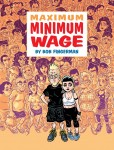 Yesterday The Mary Sue published an article noting that for-profit comic-cons might be violating federal labor law by not paying minimum wage to workers improperly classified as volunteers. However, a recent case involving Major League Baseball shows how commercial comic-cons could beat the tag.
Yesterday The Mary Sue published an article noting that for-profit comic-cons might be violating federal labor law by not paying minimum wage to workers improperly classified as volunteers. However, a recent case involving Major League Baseball shows how commercial comic-cons could beat the tag.
The use of free labor by for-profit companies has become a hot issue in recent years. Internships have become a particularly touchy topic – class action lawsuits by former interns have prompted some companies to end their unpaid internship programs, although there are at least a couple high-profile cases on appeal in which companies are challenging the Department of Labor’s standards for determining whether an intern is actually an employee.
Given how costly it can be for a company to fall afoul of federal law on this issue, it is indeed prudent for the companies that run comic conventions to assess whether it is legal for them to use unpaid volunteers. This is especially conventions run by for-profit companies, since charitable nonprofits enjoy a special exemption from minimum wage and overtime requirements in regard to volunteers. The Mary Sue has once again performed a service to the community in calling attention to this important issue.
With that in mind, in making this analysis it’s important to be aware of both the law’s requirements, the specific practices of each company, and the exemptions that are available outside the one given to charities.
First, since conventions produced by ReedPop — NYCC, ECCC, C2E2 — were mentioned in the post, it’s worth noting, as several “volunteers” have stated in the original comments thread and a related Reddit thread, that ReedPop pays volunteers minimum wage as official crew. Calling people volunteers in this context is a great way to foster a sense of community and community — one of things for which Lance Fensterman and company are to be commended is the way that they have fostered this communal sensibility while maximizing return on investment.
But not every for-profit comic-con that brings on volunteers gives these workers compensation – in fact, depending on the convention, you might actually be required to pay a fee for the privilege of helping the company out! Although this may seem on its face like a violation of federal law, there’s a legal loophole that has enabled countless commercial businesses to use volunteers in the standard sense of term.
Over the years the federal Fair Labor Standards Act has accumulated dozens of exemptions for a wide range of ventures, from homemakers making wreaths to C-level executives. For a company that operates a program taking place within a limited period of time during the year, there is one exemption in particular that catches the corporate attorney’s eye: minimum wage and overtime requirements do not apply to “any employee employed by an establishment which is an amusement or recreational establishment…” that operates no more than seven months a year or meets a financial test as to revenue generated at different times of the year. (29 USC 213(a)(3))
There are several cases that show how a commercial comic-con can take advantage of this provision, but the ruling perhaps most on-point was issued just a year ago in the Southern District of New York – coincidentally, the same federal district in which the New York Comic-Con takes place. Chen v. Major League Baseball Properties was brought by a former volunteer for the 2013 All-Star Week FanFest at the Javits Center (!), and the volunteer made arguments similar to those made in the intern lawsuits: volunteers at the event met the criteria for employee status, and thus Major League Baseball should have paid them at least minimum wage.
Major League Baseball — and the court — disagreed. As the court observed, although Major League Baseball operates all year long, Department of Labor regulations distinguish an entire enterprise from an “establishment,” which specifically refers to “a distinct place of business.” The exemption was put in place to accommodate seasonal ventures employing people for discrete periods of time in activities that might offer “non-monetary rewards.” The court concluded Major League Baseball’s FanFest was analogous to the amusement and recreational activities in view when legislators originally enacted the exemption, and the plaintiff’s federal as well as state law claims were summarily dismissed.
The plaintiff has appealed the district court’s ruling – in fact, it was argued in the Second Circuit U.S. Court of Appeals today, March 30 – but as noted above, there are a number of cases in other circuits that have reached similar conclusions. What’s more, even if the appeal succeeds, the main case being cited in opposition focuses on aspects of one baseball team’s operations that are distinguishable from a comic-con. For instance, while the team in question utilized its stadium for events throughout much of the year, comic-cons typically take place in rented facilities for discrete periods of time.
The analysis gets somewhat trickier for an entity operating multiple conventions. For instance, let’s assume that Wizard World doesn’t pay its volunteers — there’s nothing about compensation in the volunteer information packet, at least; Wizard World volunteers don’t even get munchies or parking reimbursements. The fact that Wizard World operates year-round could be grounds for arguing that the seasonal establishment exemption doesn’t apply, but there are also clever counter-arguments and organizational strategies that could persuade a court to disagree. Others have tried and succeeded with even more daunting facts – which, on a related front, is why the NCAA doesn’t have to pay taxes on ads sold for March Madness.
The seasonal exemption has long been a lifeline for companies offering an opportunity to volunteer for ventures that operate on a limited-term basis, such as amusement parks, outdoor swimming pools, Oprah’s Life You Want Tour, and New York Fashion Week. If you are an unpaid commercial comic-con volunteer who believes a lawsuit for back wages would be a clear home run, expect Major League Baseball Properties and cases like it to be deployed to strike you out.
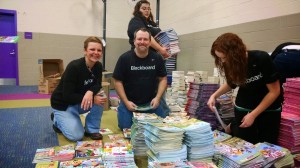 Nicole, Ian, and Ashley from Blackboard Inc., were up to their elbows in books when they noticed some young, eager faces peeking through the windows of the school gym.
Nicole, Ian, and Ashley from Blackboard Inc., were up to their elbows in books when they noticed some young, eager faces peeking through the windows of the school gym.
“The kids wanted to know what was going on. They kept coming over to look at the books and asking if they were going to get one,” said Nicole Marsh, Manager of Operations for Blackboard Somerset.
Nicole, Ian and Ashley were just a few of the employees from Blackboard at Hopkins Elementary that day. Over 30 volunteers were sorting, organizing and distributing over 3,500 books to children in need in their community.
Throughout September, Blackboard, which delivers technology solutions that help re-imagine education for students from pre-K through lifelong learning, had each Educational Services division compete to raise money to get books into the hands of kids through a First Book Virtual Book Drive. The site that raised the most money won the opportunity to distribute the books made possible by their fundraising efforts to area schools.
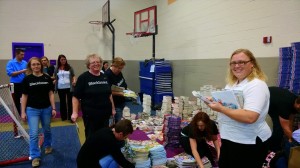 The Blackboard office in the small, rural town of Somerset, KY won the competition, raising enough money for each elementary school and one middle school in Pulaski County to receive 400 books. And they did it one cupcake and crock-pot at a time – holding potlucks and raffling off cheesecakes and a fishing trip.
The Blackboard office in the small, rural town of Somerset, KY won the competition, raising enough money for each elementary school and one middle school in Pulaski County to receive 400 books. And they did it one cupcake and crock-pot at a time – holding potlucks and raffling off cheesecakes and a fishing trip.
The schools were incredibly grateful for the books. Thank you cards have poured into the Blackboard office since the distribution.
“I hope the children in Somerset see that not only do people out there really care about them but want to see their education go further. Education is everything, especially when kids are younger.” said Nicole, “I hope that they will see our effort and want to be involved so we can continue the cycle of events like this for children in need.”
Learn more about how you can start a Virtual Book Drive to get books to kids in need in your area.
The post Books to Kids, One Cupcake At A Time appeared first on First Book Blog.

Laurie Willhalm started off this session by telling the history of Books for Wider Horizons, an outreach program of the Oakland Public Library that sends well-trained storytime readers into childcare centers and preschools in the city’s poorest neighborhoods. They started with about 3 volunteers and have grown over the past 20 years into a corps to 60 volunteers making 71 weekly storytime visits to 1300 kids at 31sites!
Celia Jackson explained the logistics of how the program works:
They are continually recruiting, in order to replace volunteers who drop out or retire. The m ajority of their volunteers are reached by word of mouth, and they also list themselves on a website called Volunteer Match. Careful screening is key to ensuring that the volunteers area good match for this program and understand the training and time commitments. There is a wirten application with references (which they carefully check), and a phone interview with 4 key questions:
-how did you hear about our program?
-what interests you about this opportunity?
-do you understand the training requirements and volunteer commitments?
-Do your have any questions?
Once recruited, volunteers recieve a binder stuffed with all the info, resources, and paperwork they’ll need, and go through an intensive training institute of 7 session over 3 weeks. All the sessions are required; not only is every element of the training important, but this also weeds out those who may want to vounteer but can’t really committ- if they can’t make all the training sessions, they probably can’t make all of their weekly storytime visits over the long term.
Gay Ducey described the training program- it indeed sounds excellent and intensive! She starts every training session by saying: “Thank your for conisidering your time and your energy spent in the service of the children of Oakland, who deserve the very best that we have.” They teach that the role of a story reader is not to teach- there are plenty of adults in their lives to do that. Their role is to bring joy in reading- to create a special, protected, magical time with books and stories that will make the children associate reading with joy and fun, so that they never stop reading.
Training sessions consist of a brief lesson, a demonstration by a librarian or active story reader, then the volunteers practice what they’ve seen in triads. They get homework to go home and practice. They progress from familiar concepts like reaading alout & singing to more unfamiliar skills like fingerplays. and feltboards. There is a survey of classic and contemporary children’s literature, and lessons on child development. The hardest thing to learn is how to hold the book- the volunteers need lots of practice! Gay says: “Our training is long, and it’s hard sometimes, but it’s fun and entertaining and it moves along at a good clip. Otherwise we might all come down a case of terminal earnestness.”
Randi Voorhies is a longtime Books for Wider Horizons volunteer, who shared her experience in the program. She echoed what Gay had already said: if any of us decide to start a similar program, don’t water down the training! Its length and depth are essential in the volunteers’ success and long-term commitment. talked about her experience.
Laurie Willhalm, in her conclusion, responded to a comment from an earlier session from a librarian who despaired of being able to build a materials collection and volunteer corps on the scale of BWH- “You are sufficient as you are.” Start with what you have and build from there as you’re able.
Laurie Willhalm’s contact info for more information: [email protected], 510-238-2848
http://www.ala.org/alsc/sites/ala.org.alsc/files/content/NI14Handouts/Building%20Walls.pdf


By: Carolyn Napolitano,
on 9/7/2014
Blog:
OUPblog
(
Login to Add to MyJacketFlap)
JacketFlap tags:
leadership,
volunteers,
community development,
*Featured,
Occupy Wall Street,
Ferguson,
Hahrie Han,
How Organizations Develop Activists,
Books,
Sociology,
Politics,
Organization,
Current Affairs,
protest,
activism,
Add a tag
Now that the National Guard and the national media have left, Ferguson, Missouri is faced with questions about how to heal the sharp power inequities that the tragic death of Michael Brown has made so visible. How can the majority black protestors translate their protests into political power in a town that currently has a virtually all-white power structure?
Recent experiences demonstrate that moving from protest to power is no easy task. For 18 days in 2011, hundreds of thousands of protestors filled Tahrir Square in Egypt to bring down the government of Hosni Mubarak, but three years later, the Egyptian military is back in power. Hundreds of Occupy Wall Street protestors encamped in Zucotti Park for 60 days in the fall of 2011, but few policies resulted that help ameliorate the income inequality they protested. Both of these movements, and many others like them — from Gezi Park in Turkey to the Indignados in Spain — were able to draw hundreds or thousands of people to the streets in a moment of outrage, but lacked the infrastructure to harness that outrage into durable political change.
Protestors in Ferguson risk the same fizzle unless they can build — and maintain — a base of engaged activists and leaders who will persist even after the cameras leave. Transformation of entrenched power structures like a military regime in Egypt, or structures of inequality and state-sanctioned police force in the United States happens only when there is a counterbalancing base of power. That counterbalancing base of power, has to come from the people.
How do people, in these instances, become power? Research shows that building collective power among people depends on transforming people so that they develop their own capacity as leaders to act on injustices they face. Transforming protest into power, in other words, starts with transforming people.
So how are people transformed? Research shows that 79% of activists in the United States report becoming engaged through a civic organization. Every day, thousands of civic organizations across the country, from the NAACP to the Tea Party, work to transform people into activists to win the victories they want.
Yet many of these organizations are still unsure of the best way to build the kind of long-term activist base needed in Ferguson. Many organizations know how to craft messages or leverage big data to find people who will show up for a rally or one event. Few organizations know how to take the people who show up, and transform some of them into citizen leaders who will become the infrastructure that harnesses energy from a week of protest into real change.
I spent two years comparing organizations with strong records of ongoing activism to those with weaker records to try to understand what they do differently. I found that it comes down to their investment in building the motivation, knowledge, and skills of their members. Turning protest into power begins with creating opportunities for people like the residents of Ferguson to exercise their own leadership.
Consider Priscilla, a young organizer working in the rural South to engage people around shutting down coal. When she first started organizing, Priscilla spent all of her time finding people who would show up for town halls, public meetings, and press events. She devoted hours to writing catchy messages and scripts that would get people’s attention, and asked her volunteers, mostly older retirees, to read these routinized scripts into the voicemail of a long list of phone numbers.
After several months of this work, Priscilla was exhausted. She wanted something different. An experienced organizer told her to invest time in developing the leadership of a cadre of volunteers, instead of spending all her time trying to get people to show up to events. Others scoffed at this advice: volunteers don’t want to take on leadership, they said. They want to take action that is easy, makes them feel good, and doesn’t take any time.
Priscilla decided to give it a try. She reached out to a group of likely volunteers to ask them to coffee. She began to get to know them as people. When some agreed to volunteer, she sat them down and explained the larger strategy behind the town hall meeting they were planning, instead of handing them a long list of phone numbers to call. Then, she asked the volunteers what piece of the planning they wanted to be responsible for.
Priscilla started spending her time training and supporting these volunteers in the tasks they’d chosen to oversee. With her help, these volunteers developed their own strategies for getting media for the event, identifying a program of speakers, and leveraging their own social networks to generate turnout. When the big day arrived, more people showed up than Priscilla would have been able to get on her own. More importantly, after the event was over, she also had a group of volunteer leaders exhilarated by their experience running a town hall and eager to do more.
Instead of just getting bodies to fill a room, Priscilla had begun the process of developing leaders. Instead of just coming to one rally, those leaders stayed with and built the campaign that eventually shut down the coal plant in their community.
There are talented organizers on the ground in Ferguson trying to do just what Priscilla did: give residents opportunities to develop the skills and motivation they need to make the change they want. Only by developing those kinds of leaders will organizations in Ferguson develop the infrastructure they need to turn the protest into real power for the residents who feel disconnected from it now.
When Alexis de Tocqueville observed America in the 1830s, he famously wrote that civic organizations are the backbone of our nation because they act as “schools of democracy,” teaching people how to work collectively with others to advance their interests. De Tocqueville is as right today as he was 174 years ago. We have always known that people power democracy. What protests from Occupy to the Arab Spring to Ferguson are teaching us is that democracy can also power people.
Headline image credit: “Occupy Wall Street” by Darwin Yamamoto. CC BY-NC-ND 2.0 via Flickr
The post Moving from protest to power appeared first on OUPblog.

They each shared their reasons for being there – cherished memories of reading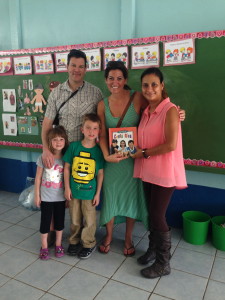 with a parent, the desire to instill a love of reading in their own kids, wanting to honor a father’s passion for education. It was the first task Joy Brooke, co-chair of First Book’s Seattle volunteer chapter, asked her members to complete.
with a parent, the desire to instill a love of reading in their own kids, wanting to honor a father’s passion for education. It was the first task Joy Brooke, co-chair of First Book’s Seattle volunteer chapter, asked her members to complete.
“Everyone had a story that led them to First Book. And everyone believed in the simple goal of getting books to kids,” said Joy. Joy herself was drawn to the idea of helping put new books into the homes of low-income families. As a teacher and a mother of two who is also earning her doctorate in Education Leadership, she also loves how much flexibility and creativity she has a First Book volunteer.
In the past year, she and the Seattle volunteer chapter held a unique fundraising event a local glassblowing studio, distributed a truckload of 40,000 books to local kids in need and hosted their 3rd Annual Storytime event with local celebrities.
To top it all off, Joy took advantage of a recent family vacation to provide new books to kids in Costa Rica. Her own kids joined her on a visit to a school in the coastal town of Quepos where they toured the library and read stories in Spanish. “The experience,” she said, “was the most rewarding part of the trip. It cost so little and was worth so much.”
First Book is grateful to Joy and all the volunteers who help bring books to kids across the country and around the globe. To join First Book as a volunteer, visit www.firstbook.org/volunteer.
The post The Joy of Giving Back appeared first on First Book Blog.


By: Samantha McGinnis,
on 4/10/2014
Blog:
First Book
(
Login to Add to MyJacketFlap)
JacketFlap tags:
books,
Books & Reading,
Advisory Boards,
First Book,
Book Distributions,
Volunteers,
book distribution,
National Volunteer Week,
First Book Supporters,
Add a tag
New homes, a birthday party and a seaplane … what do these have in common?
These are all ways that First Book volunteers got books to kids in need this year. First Book has a network of dedicated and passionate volunteers in hundreds of communities in the U.S. and Canada who support our efforts to provide books and educational resources in fun and innovative ways.
Just last year, First Book volunteers distributed over 613,000 books all across the United States! Here are a few of our favorite First Book volunteer stories:<!--[if gte mso 9]>
Normal
0
false
false
false
EN-US
X-NONE
X-NONE
MicrosoftInternetExplorer4
<![endif]-->
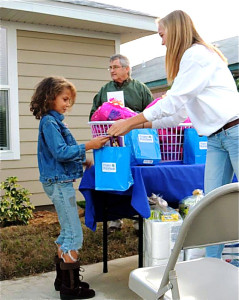 Tess Reiman, a 9th grader who raised funds for First Book to support Habitat for Humanity in Atlantic Beach, Florida. While her brother volunteered building houses with Habitat, Tess saw that many of the children moving into new homes did not have any books to fill their newly constructed rooms.
Tess Reiman, a 9th grader who raised funds for First Book to support Habitat for Humanity in Atlantic Beach, Florida. While her brother volunteered building houses with Habitat, Tess saw that many of the children moving into new homes did not have any books to fill their newly constructed rooms.
Tess created “Project Storybook” and raised the money needed to help get new books into these children’s hands. She then purchased books from the First Book Marketplace and donated baskets of new books to for their new Habitat homes. In her first year, she donated over 200 new books to 40 families.
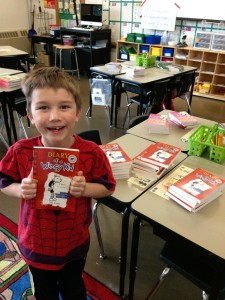 Seven year old Maguire Brooke loves to read. This year he didn’t want birthday presents. He wanted his friends and family to help him get books to kids in need. With the support of First Book-Seattle he created a virtual book drive, raised $500, donated 200 books to two second-grade classrooms and provided a starter library of six books to each child. Titles included some of Maguire’s favorites, including the Magic Treehouse series and The Diary of A Wimpy Kid.
Seven year old Maguire Brooke loves to read. This year he didn’t want birthday presents. He wanted his friends and family to help him get books to kids in need. With the support of First Book-Seattle he created a virtual book drive, raised $500, donated 200 books to two second-grade classrooms and provided a starter library of six books to each child. Titles included some of Maguire’s favorites, including the Magic Treehouse series and The Diary of A Wimpy Kid.
“It was awesome,” Maguire said. “I’m the proudest person on earth.”
Books by dog sled, boat, ATV and seaplane! Many remote areas in the Alaskan Bush are only accessible via these modes of transportation. That didn’t stop First Book-Anchorage from distributing 47,000 books to schools in over 55 rural Alaskan communities. They also distributed approximately 33,000 books in Anchorage.
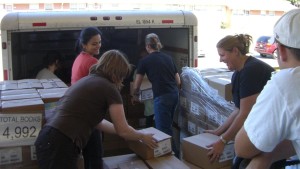 Every child from pre-school to 12th grade received 3 to 5 books each. To secure these books, the volunteers fundraised, received in-kind support and connected First Book to local programs and classrooms. There are over 85 K-12 schools located throughout rural Alaska that are not meeting their Academic Yearly Progress (AYP) in more than 4+ years in the area of literacy.
Every child from pre-school to 12th grade received 3 to 5 books each. To secure these books, the volunteers fundraised, received in-kind support and connected First Book to local programs and classrooms. There are over 85 K-12 schools located throughout rural Alaska that are not meeting their Academic Yearly Progress (AYP) in more than 4+ years in the area of literacy.
We’ve put tons of new books into the hands of a lot of children in need in the last twenty-plus years and we couldn’t have done it without our volunteers. Thank you!
Click here to learn more about volunteering with First Book.
The post Just How Many Books Can Volunteers Get to Kids in One Year? appeared first on First Book Blog.

It was only 6:30 in the morning, but over 100 teachers had already lined up outside of the Children’s Museum of Houston – each eagerly waiting to select new books for their students.
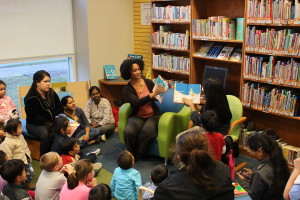 “It is hard to describe the lump I had in my throat when I drove up and saw all the teachers who had come at that early hour, from all over Houston,” said Patricia Gres Shuford, a collegiate member of Pi Beta Phi Fraternity.
“It is hard to describe the lump I had in my throat when I drove up and saw all the teachers who had come at that early hour, from all over Houston,” said Patricia Gres Shuford, a collegiate member of Pi Beta Phi Fraternity.
Patricia volunteered with her New Mexico Alpha chapter to help distribute 20,000 books in Houston as part of Pi Beta Phi’s Fraternity Day of Service, conducted in partnership with First Book. She spent the day sharing stories and loading books into the cars of over 300 Houston-area educators and program leaders serving kids in need.
“The teachers were so excited and grateful,” said Patricia. “Helping distribute these books was such a rewarding experience.”
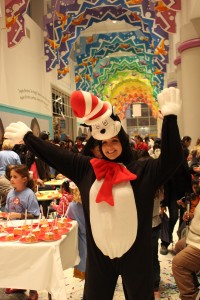 First Book, and longtime partner Pi Beta Phi, also touched the lives of kids in need in Baltimore, Long Beach, Calif. and Nashville, Tenn. In addition to the Fraternity Day of Service book distributions, hundreds of kids joined Pi Phi volunteers to enjoy Dr. Suess®-themed story times, visits from the Cat in the Hat and reading with therapy dogs. Across all four cities, local kids are now reading, learning and loving over 80,000 brand-new books.
First Book, and longtime partner Pi Beta Phi, also touched the lives of kids in need in Baltimore, Long Beach, Calif. and Nashville, Tenn. In addition to the Fraternity Day of Service book distributions, hundreds of kids joined Pi Phi volunteers to enjoy Dr. Suess®-themed story times, visits from the Cat in the Hat and reading with therapy dogs. Across all four cities, local kids are now reading, learning and loving over 80,000 brand-new books.
First Book looks forward to its continued partnership with Pi Beta Phi through the Read > Lead > Achieve® initiative, inspiring a lifelong love of reading and impacting one life at a time.
To learn more about how you can volunteer with First Book, visit www.firstbook.org/get-involved/volunteer.
The post 80,000 Books to Help Kids Read, Lead, Achieve appeared first on First Book Blog.

First Book volunteers in Seattle, teamed up with Glassybaby for a night of giving to raise money for new books for kids who need them in the Seattle – King County area. Since 1998, Glassybaby has donated over 1.5 million dollars to Seattle based charities and First Book. First Book fundraising volunteers and guests joined together for a night at the Glassybaby studio to watch professional glass blowers create Glassybabies and share in the joy of giving new books to kids in need.
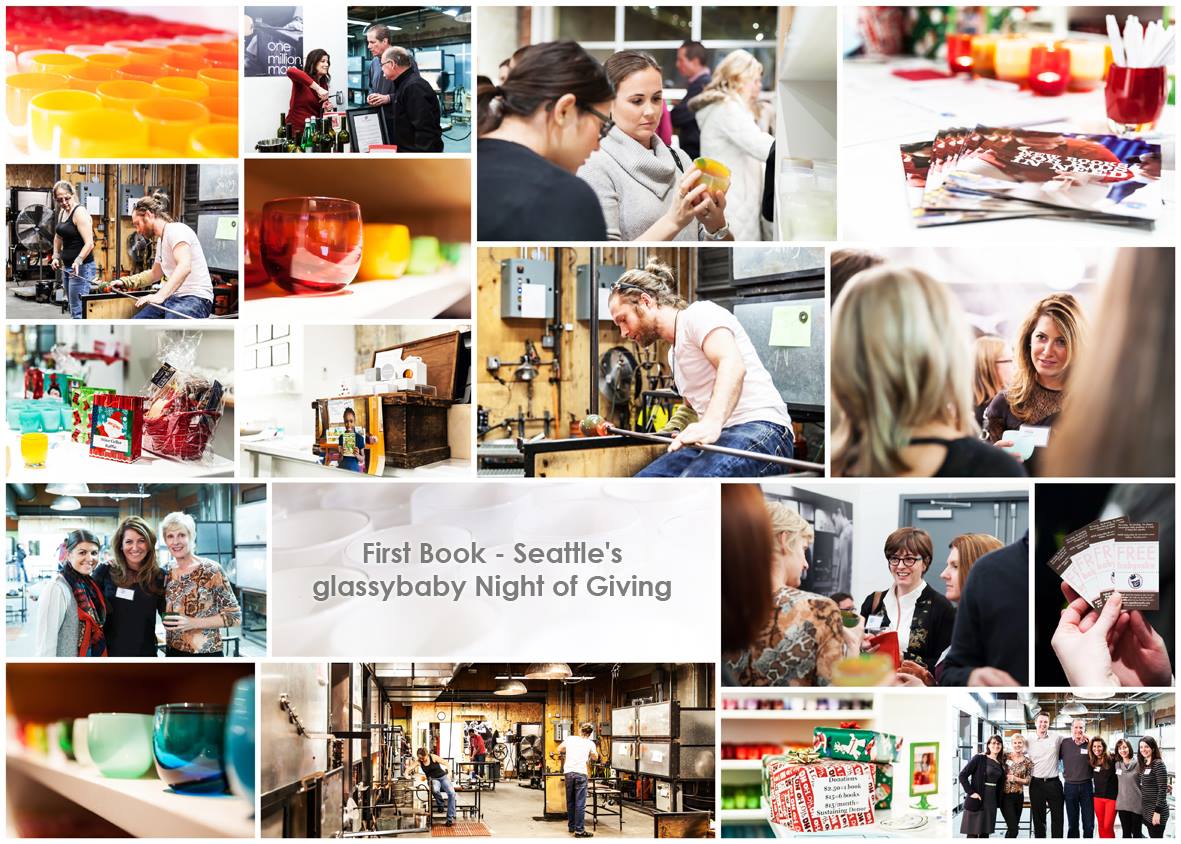
“We have seen with every event, once people hear about First Book and what we are trying to do they go out of their way to help – whatever is needed; money, venue, food, awareness and always smiles,” Says Jody Ericson Dorow, Co-Chair of First Book – Seattle.
Guests could pre-order their own Glassybaby, or purchase one the night of the event with a portion of the sales going to support First Book in Seattle. The local volunteers work to provide book grants to eligible schools and programs in the Seattle area.
Joy Brooke, Co- Chair of First Book- Seattle, said of the event, “It was truly a team effort by the volunteers to pull this fundraising event together. A goal we set in August was to put on a successful adult-only event that would bring in a whole lot of books to kids, and we did it! It was an amazing evening watching glassblowing, drinking wine, eating appetizers, shopping at Glassybaby, but most of all sharing the message of the importance of getting books to kids who need them most. We are grateful for all the support First Book-Seattle received that night and look forward to many more fun events in the future that help put books in the hand of kids.”
Thank to the generous support of Glassybaby, First Book volunteers were able to raise over $4,000, which was enough to purchase 1,600 new books for children in the Seattle – King County area. To learn more about First Book – Seattle visit them online and to learn more about how you can volunteer with First Book visit: http://www.firstbook.org/get-involved/volunteer .
The post First Book and Glassybaby Unite for a Night of Fundraising appeared first on First Book Blog.

The creative minds in Memphis took advantage of one of the most teen popular book collections to create a fundraising event so good we had to share it!
 First Book supporters in Memphis recently held a fundraiser at the Autozone Challenge Center, located within the Salvation Army Kroc Center, to help put new books in the hands of children in need. Teams competed in a series of mental and physical challenges in theme of the ‘Hunger Games’ books.
First Book supporters in Memphis recently held a fundraiser at the Autozone Challenge Center, located within the Salvation Army Kroc Center, to help put new books in the hands of children in need. Teams competed in a series of mental and physical challenges in theme of the ‘Hunger Games’ books.
“This event challenged students intellectually and physically, and gave them a fun opportunity to give back to their community,” said Lolly Easley. “We chose the theme because the ‘Hunger Games’ trilogy is a favorite series for the younger generation. Teens celebrated their love of this series, while helping children in need and supporting literacy in Memphis.”
The event raised $1205, enough money to purchase over 480 new books for Memphis area children who need them.
The post Hunger ‘For Books’ Games appeared first on First Book Blog.


By: Brian Minter,
on 10/22/2013
Blog:
First Book
(
Login to Add to MyJacketFlap)
JacketFlap tags:
Books & Reading,
Advisory Boards,
Book Recipients,
New Orleans,
First Book,
Book Distributions,
Guest Blog Posts,
Glacier National Park,
Volunteers,
RV,
First Book Supporters,
Brenda Berg,
Gump Trip,
Add a tag
Today’s blog post is by Brenda Berg, who loaded her family into an RV and spent over half a year traveling across the country. They called their adventure the Gump Trip, and along the way they distributed 6,000 brand-new books to kids in need at local schools and community programs in the First Book network.
Have you ever sat in the carpool lane and dreamed about your next vacation? Last year, I decided to make it a reality. The plan – before my daughter entered middle school– was to go from music lessons and organized sports to something real.

Brenda Berg and her children at Glacier National Park
After months of getting things in order, my kids and I set off on an adventure of a lifetime, traveling to 49 states and two Canadian provinces. (We were also joined by an exchange student from Sweden and my husband joined us about once a month.) In seven-and-a-half months, we traveled over 35,000 miles.
Instead of guitar lessons, we visited the Fender guitar factory and attended live concerts. Instead of indoor climbing classes, we climbed in Alaska and hiked in dozens of national parks. Instead of textbooks, we visited dozens of historic and interesting sites. We definitely got real!
Our commitment to ‘return to real’ extended beyond national parks and factory tours. We were also committed to education and service. In order to reach hundreds of children across the country in a real way, we partnered with First Book to give new, high-quality books to kids in need.
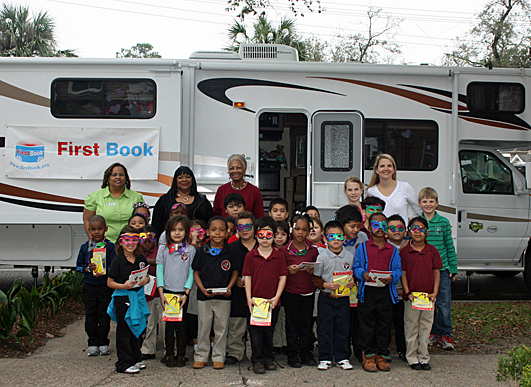
The Berg family and First Book volunteers with local children in New Orleans
Of the 200 stops we made along the way, the six First Book events – where we worked with local First Book volunteers gave away new books to kids in need – were our favorite experiences, ones that will change our lives forever. We gave away over 6,000 books and met with hundreds of children to talk about traveling in our amazing country. The smiles from those children were better than the sunrise over the Grand Canyon (and that’s a sight that is hard to beat!).
Most of us look for ways to give back in our communities, but I encourage people to consider giving back as they travel. There are isolated and other under-supported communities all over America that will benefit and you will gain a whole different perspective on America at the same time. And, just like your efforts at home, you will get back far more than you will give.
Inspired? Visit First Book on the web to find out how you can volunteer or raise funds to help kids in need get the brand-new books that will change their lives.
The post Across America in an RV With First Book appeared first on First Book Blog.


By: Brian Minter,
on 10/9/2013
Blog:
First Book
(
Login to Add to MyJacketFlap)
JacketFlap tags:
Book Distributions,
Marketplace,
Book Recipients,
Teachers,
Volunteers,
Dayton,
National Book Bank,
donated books,
free books,
First Book,
Ohio,
First Book Marketplace,
First Book National Book Bank,
Add a tag
I have been signed up with First Book for several years. I teach kindergarten and first grade at Dayton Public Schools in the poverty-stricken inner city of Dayton, Ohio. I get plenty of emails from First Book, but have never received one book. Most books seem to be located in a warehouse in a large metropolitan area. You would have to drive a truck through states to get there.
– Mary Reed
Dayton Public Schools
Hi Mary,
It sounds like you signed up with First Book to get new books for your students, but we haven’t been able to help you make that happen yet. Let’s fix that.
There are actually two different ways you can get books from First Book.
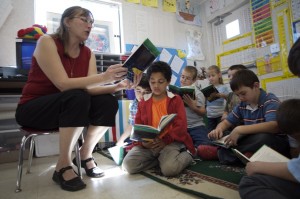 The First Book Marketplace: Over 5,000 popular and award-winning titles, from board books to college prep, available exclusively to educators serving kids in need. This channel is great for teachers like you, who often need specific titles for their students.
The First Book Marketplace: Over 5,000 popular and award-winning titles, from board books to college prep, available exclusively to educators serving kids in need. This channel is great for teachers like you, who often need specific titles for their students.
The First Book National Book Bank: The nation’s only clearinghouse for large-scale book donations from publishers. These brand-new books are available free of charge (plus a shipping & handling fee), in carton quantities, and are perfect for educators or program leaders who want to help children start home libraries of their own.
Books from the The First Book Marketplace are available 24 hours a day, while books from the The First Book National Book Bank are available as new donations come in, usually once a month.
When we receive new books from publishers for the National Book Bank, they’re sent to a (borrowed) warehouse and we ship them out to everyone who requested books. We try to hold these local book distributions in different cities around the country, which helps people who can’t afford even the shipping charges.
But you don’t have to wait until there’s a book distribution near you. Once you’re sign up with First Book, you’re eligible for free books from every single distribution, whether the warehouse is in San Diego or Boston.
So the next time you get an email letting you know about a book distribution, check out the title list and let us know which books your kids will love and we’ll do everything we can to help you get them.
And we’ll put Dayton on our list of cities to visit someday soon.
Thanks for writing!
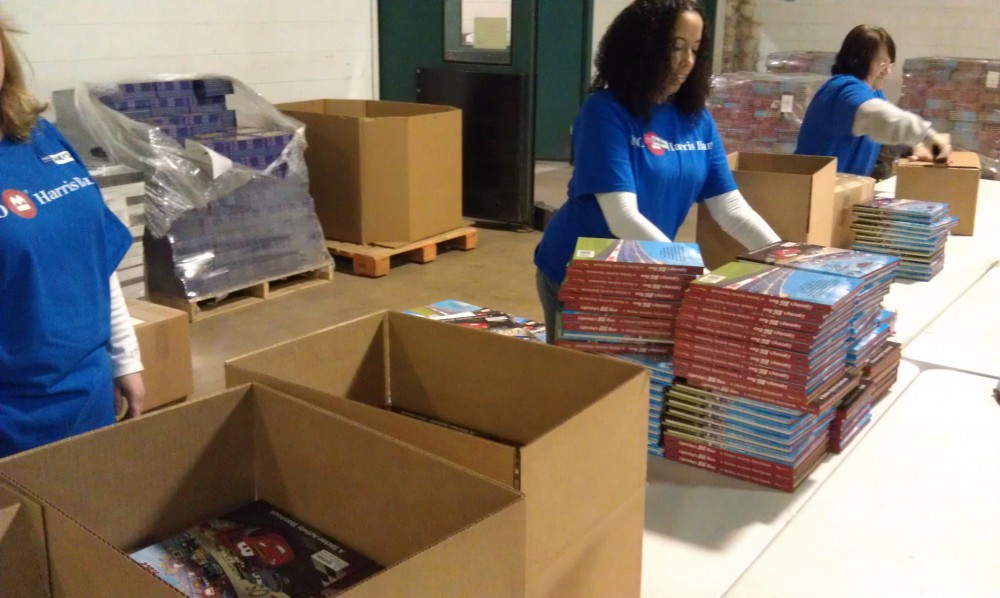





The post We’re Coming to Your Town Someday… But It Doesn’t Matter appeared first on First Book Blog.


By: Kyle Zimmer,
on 9/24/2013
Blog:
First Book
(
Login to Add to MyJacketFlap)
JacketFlap tags:
international,
Literacy,
Books & Reading,
Education,
Book Recipients,
India,
First Book,
global,
Brazil,
Social Entrepreneurship,
Egypt,
Kyle Zimmer,
Volunteers,
Clinton Global Initiative,
social enterprise,
First Book Supporters,
The Stories for All Project,
#CGI2013,
First Book Global,
Add a tag

In 2012, Malala Yousafzai, age 15, was shot in the face by Taliban thugs for daring to promote education for women and girls in her native Pakistan. She has not only survived, she has taken her cause to the global level. Her speech before the United Nations inspired the world: “One child, one teacher, one book and one pen can change the world.”

I think of Malala often; her words and the battle she is waging against forces determined to keep her away from a world of knowledge. We know that one child with one book can change the world. But millions of children are being held back from the knowledge they’re so hungry for, not only by violent fundamentalism but by relentless poverty. This is a battle, and we have to win.
That’s why today at the Clinton Global Initiative meeting in New York, I announced First Book’s commitment to reach 10 million children worldwide by 2016 with the books they need to read, learn and succeed.
First Book Global: New Books to Kids At Home and Around the World
Each year, First Book, a nonprofit social enterprise, connects 2 million children from low-income families in the United States and Canada with brand-new, top-quality books and educational materials. Over the next three years, we will expand our efforts globally, reaching classrooms, programs and NGOs in India, Brazil, Egypt and elsewhere.
 Our efforts abroad will strengthen our work domestically. One of our core missions is to bring children here in the United States books and digital content that reflects the full diversity of the world. As we expand the market for books and materials in a range of languages, countries, and cultures, the array of content we can offer in the United States will also grow. More stories will be available to all children.
Our efforts abroad will strengthen our work domestically. One of our core missions is to bring children here in the United States books and digital content that reflects the full diversity of the world. As we expand the market for books and materials in a range of languages, countries, and cultures, the array of content we can offer in the United States will also grow. More stories will be available to all children.
We’ve been preparing for global expansion for a long time. Our team at First Book has already learned from pilot projects around the world with partners including Feed The Children, World Vision and Touch A Life Foundation. We have been in discussions with a variety of potential global partners who are eager to work with us to access new educational resources that have been so scarce for the children they serve.
A Real and Urgent Need
Make no mistake. It will be hard work. The demands on our staff, volunteers and partners will be staggering, and the fundraising needs are daunting.
But we don’t have the luxury of waiting until it’s easy.
Children in poverty around the world are waiting for us, and so are the local heroes working to educate them. They have no supply pipeline for books, calculators, educational games and digital readers. First Book is the missing piece, and they need us now.
Over the next three years, we’ll be building our content, our partnerships and our outreach, and we’ll be asking you to help us fulfill this commitment to children around the world.
Click here to sign up for occasional email updates about First Book and our global expansion, and to learn ways you can get involved.
The post The Power of Children’s Books to Change the World appeared first on First Book Blog.

Who knew Harley riders and Harriet the Spy could go together?
On August 10 the second annual Children’s Literacy Motorcycle Run was held, sponsored by Chuck’s Harley Davidson, Coldwell Banker, and the Leathernecks Motorcycle Club, among others. With the campaign slogan “Live to ride… Ride so children can read,” the event raised almost $2,000 for books to kids in Bloomington, IL.
Obviously these volunteers were born to be wild… and get books to kids!





The post Harley Riders Raise Money for Books to Kids appeared first on First Book Blog.


By: Gina Rullo,
on 4/23/2013
Blog:
First Book
(
Login to Add to MyJacketFlap)
JacketFlap tags:
Volunteers,
First Book Advisory Boards,
National Volunteer Week,
First Book Supporters,
Literacy,
Advisory Boards,
Education,
Philanthropy,
First Book,
volunteer,
Add a tag
First Book is a nonprofit social enterprise that provides new books to programs and schools serving children in need. Dedicated volunteers around the country (called First Book “Advisory Boards”) raise funds in their communities to provide brand-new books to local schools and programs, and YOU can be a part of that.
Learn New Skills
Volunteering with First Book means you can gain new skills, adding professional value to resumes and college applications. There are a wide range of skills that you can develop, including community outreach, partnership building, fundraising, event planning and grant writing.
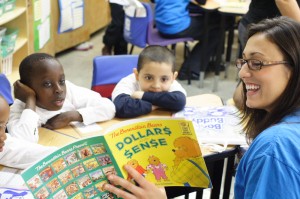
Meet New People
When you volunteer, you get to meet new people who share the same interests. Volunteering can lead to networking opportunities or even new friends! You will have all kinds of things to talk about as you discuss why you decided to volunteer with First Book when meeting and interacting with fellow volunteers.
Community Ties
By volunteering your time with a First Book Advisory Board in your community, you are furthering First Book’s mission and getting books into the hands of kids in your local area. Advisory Board members can impact the quality of education for local programs and classrooms by providing books and resources.
It’s Good For You
When you are looking for something new to do that’s good for you, volunteering keeps you busy and active. According to health and fitness website, Greatist.com, a past study has shown that “People who volunteered for selfless reasons and to create valuable relationships decreased the risk of mortality.” Not only does volunteering give you a sense of fulfillment, but also wellness.
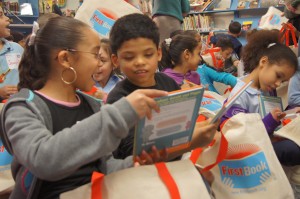 You Make A Difference
You Make A Difference
If you offer your time and volunteer with First Book then you will be helping us get brand-new books into the hands of more kids in need. Together we can transform the lives of children in need and elevate the quality of education.
Find out more information about how you can volunteer with First Book by clicking here.
The post Lose Ten Pounds & Get More Dates: Five Reasons to Volunteer with First Book appeared first on First Book Blog.


By: Shannon Burke-Kranzberg,
on 3/14/2013
Blog:
First Book
(
Login to Add to MyJacketFlap)
JacketFlap tags:
books,
reading,
Literacy,
Books & Reading,
Advisory Boards,
Education,
First Book,
service,
AmeriCorps,
Volunteers,
First Book Partners,
First Book Supporters,
Add a tag
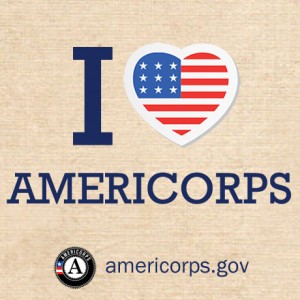 This week, many of our partners and recipient groups are celebrating AmeriCorps Week to recognize the service of the AmeriCorps members working within their organizations to elevate the quality of education for the children they serve. Here at First Book, we’re proud to have some AmeriCorps alums on our staff and as volunteers working to help get more books out to the kids who need them most.
This week, many of our partners and recipient groups are celebrating AmeriCorps Week to recognize the service of the AmeriCorps members working within their organizations to elevate the quality of education for the children they serve. Here at First Book, we’re proud to have some AmeriCorps alums on our staff and as volunteers working to help get more books out to the kids who need them most.
Charlette Kremer was an AmeriCorps VISTA member serving at Lewis-Clark State College (LCSC) in Lewiston, Idaho, in 2005. One of her first assignments was to establish a First Book College Advisory Board. Today, Charlette is the director of the Lewis-Clark Service Corps, which is the department where she served, and her staff now oversees First Book-LCSC, which provides books to four counties in Idaho and one in Washington. “Just last week, the Advisory Board met and awarded over $8,000 in books to nine organizations,” she said. “That brings our total to more than 48,000 books in just seven years. It’s a legacy for which I am very proud.”
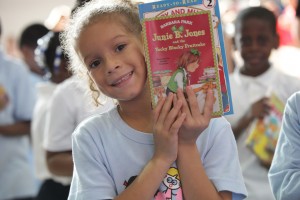 Jonelle McCoy is a current AmeriCorps member serving in youth mentoring program at LCSC, but because of her experience working with students in the community struggling with literacy, she said she “jumped at the chance to volunteer” with First Book-LCSC. Her AmeriCorps service has given her the opportunity to work directly with students in the community struggling with literacy.
Jonelle McCoy is a current AmeriCorps member serving in youth mentoring program at LCSC, but because of her experience working with students in the community struggling with literacy, she said she “jumped at the chance to volunteer” with First Book-LCSC. Her AmeriCorps service has given her the opportunity to work directly with students in the community struggling with literacy.
“It’s clear to me that the books we are giving to schools and agencies will make reading more accessible to hundreds of pre-K and elementary students in our local and satellite communities,” Jonelle said. “My hope is that one day soon there won’t be a need for my service, but until that day comes, volunteering with First Book remains a powerful way to impact and support early readers before they become the youth I see struggling in middle school.”
We’re proud to support AmeriCorps and the Corporation for National and Community Service with access to new, high-quality books and educational resources for the kids they serve across the country!


By: Brian Minter,
on 1/21/2013
Blog:
First Book
(
Login to Add to MyJacketFlap)
JacketFlap tags:
Books & Reading,
Authors & Illustrators,
First Book Events,
First Book,
Book Distributions,
Martin Luther King,
Obama,
Doreen Rappaport,
Martin's Big Words,
Washington D.C.,
Eva Longoria,
Volunteers,
KPMG,
National Mall,
National Day of Service,
AFT,
First Book Partners,
American Federation of Teachers,
Virtual Book Drives,
#iserve,
Chelsea Clinton,
Inauguration Day 2013,
KPMG's Family for Literacy,
Add a tag
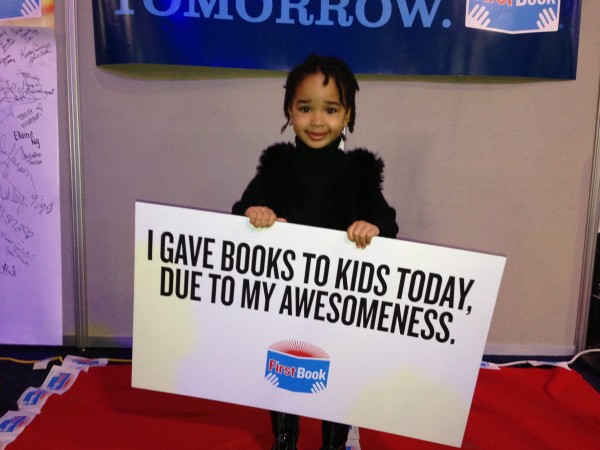
On Saturday, volunteers from across the country joined First Book on the National Mall in Washington DC to celebrate President Obama’s National Day of Service by providing 15,000 brand-new books to DC-area children from low-income families.
Click here to see photos of the event, including pictures of volunteers, political leaders, and even a few celebrities.
First Book was one of seven nonprofits featured at the event, highlighting the idea of community service in such areas as education, the environment and support for military families.
??Each volunteer packed two books into a bag, and decorated bookplates with personal messages.

The books, including “Martin’s Big Words: The Life of Dr. Martin Luther King, Jr.” by Doreen Rappaport, were provided thanks to the generous support of our friends at KPMG, the U.S. audit, tax and advisory firm, through its KPMG’s Family for Literacy program.
The bags will be distributed in the coming days to students throughout DC, thanks to First Book’s partnership with the American Federation of Teachers.
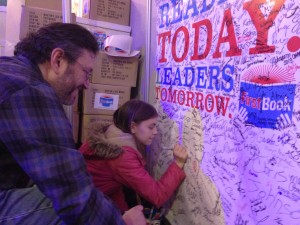
Even if you weren’t able to join us on the National Mall, you can still bring new books to kids in need. Click here to donate to our National Day of Service Virtual Book Drive. Every $2.50 provides one new books to a child in need.


By: Brian Minter,
on 12/20/2012
Blog:
First Book
(
Login to Add to MyJacketFlap)
JacketFlap tags:
2012,
Kyle Zimmer,
Success Stories,
Volunteers,
year-end,
infographic,
#bookstokids,
books to kids!,
First Book Supporters,
Book Recipients,
First Book,
Book Distributions,
Add a tag
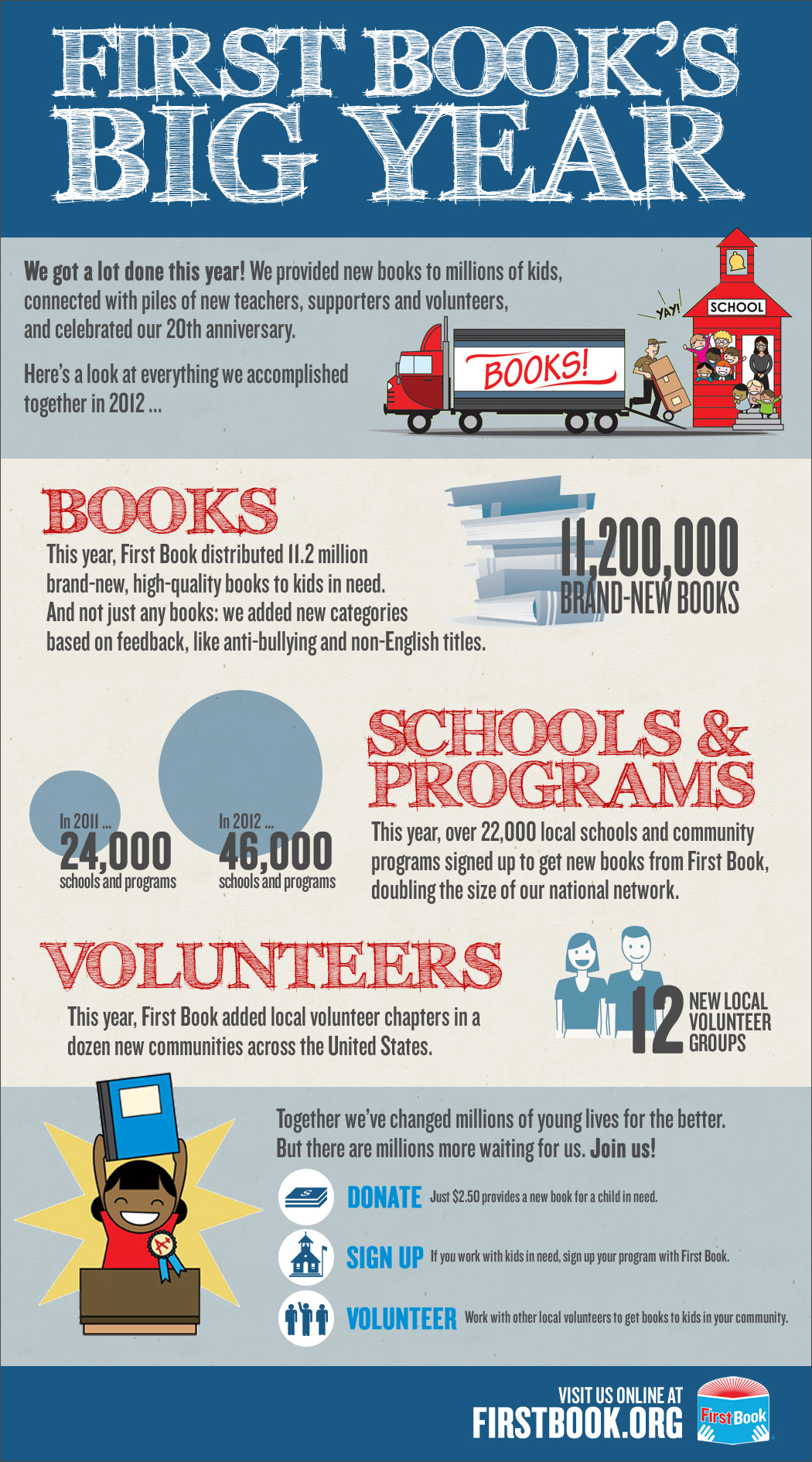
* Click on the graphic to see a bigger, snazzier version.
Learn more about how First Book provides new books to kids in need, and how you can get involved, at firstbook.org. 


By: Gina Rullo,
on 9/5/2012
Blog:
First Book
(
Login to Add to MyJacketFlap)
JacketFlap tags:
First Book Supporters,
Malaika Abramson,
The Reading Lion,
books,
reading,
Books & Reading,
education,
Amazon,
Philanthropy,
First Book,
Volunteers,
Add a tag
You can change the world at any age. Ten-year-old Malaika Abramson has illustrated how she wants to inspire kids to read. The young, savvy entrepreneur created a website entitled “The Reading Lion”, a book recommendation site where purchase links to Amazon are embedded within the content, resulting in a percentage of profit to the site’s creator.
Malaika is on a mission to make an impact  on literacy by donating proceeds to First Book. She is wise beyond her years and told us why she wanted to donate to First Book. “I love reading and I want other kids less fortunate than me to enjoy books as well”, said Malaika.
on literacy by donating proceeds to First Book. She is wise beyond her years and told us why she wanted to donate to First Book. “I love reading and I want other kids less fortunate than me to enjoy books as well”, said Malaika.
With the help of a team consisting of family and friends, Malaika graciously contributed funds to First Book raised through a book and lemonade stand. Her tireless support has provided over 30 books to children in need.
She is doing more than just encouraging others to read, she is inspiring us all to make a difference.

Today’s blog post is from Abby Bartholomew. Abby works for Kenexa Corporation, a company with a stellar philanthropy program allowing recipients to donate their full-time efforts for three months to an organization of their choice. Abby was one of the chosen employees this year and is volunteering in Denver, CO from May through July.
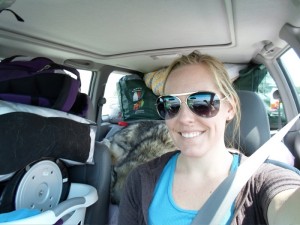
When I heard about this opportunity through work, I was thrilled–and First Book was the first organization that came to mind. A few years ago, I wrote my undergraduate thesis about creating an innovative way to increase youth interest in reading. Part of my research was identifying current organizations promoting literacy and reading, and First Book always stuck out in my mind as a leader in the community.
I contacted the Denver Metro Advisory Board, one of the closest boards to my home in Nebraska, during my application process and they were excited about the possibilities but informed me that they were struggling and might not be around by my arrival. But Kate Fergusson, our Community Development Manager, thought my skills and background would be perfect for revitalizing the board. So in late April my husky and I moved out to Denver!
The board had disintegrated by the time I arrived. Good news? We had the opportunity to start fresh. Bad news? I had basically no contacts or networks to tap into the Denver community. As I wrap up my last couple of weeks here, I’ve been contemplating everything I’ve learned about First Book, advisory boards and myself. I narrowed it down to three major things.
One: Boards are not a one-man show for a reason.
This may seem obvious, but some part of my subconscious thought it would be possible for me to successfully run things solo while working to develop board membership. But boards have members for a reason. My time here helped me indentify some of my personal strengths, but also some of my weaknesses. I learned the value not only of members but of members with particular talents, i.e. ones I don’t have. Over the last few weeks, we’ve been building up the board and I can already see how the Denver board will flourish with the talented folks who are stepping up.
Two: Networks are important.
I feel like I need to bold that, underline it, or maybe have fireworks shooting out of it for the appropriate emphasis. I accomplished some great things when I was working alone, but since members have stepped up I can already see the board’s velocity skyrocketing. From one member’s experience running a local literacy nonprofit for years to another’s experience in the education and library systems, the ideas and connections seem endless.
Three: First Book is chock-full of passionate people.
I never doubted this statement, but I am still surprised by the intensity and drive of everyone I talk to and work with. From the national office to the handful of advisory boards I spoke to, people here really care about getting as many books as possible into the hands of kids. It’s incredibly inspiring and motivating. That might sounds cheesy, but it’s true!
I’m sad that I have to leave Denver soon, but am excited to get home and start a board in Lincoln, NE. I can’t thank everyone at national and on the Denver board enough for this experience and I hope to always have some kind of involvement in First Book! If you want to see what the Denver board has been up to, check it out on facebook, twitter or our blog. I’m also doing a personal fundraiser to leave behind a little something tangible for the Denver board and our reci
Library volunteers come in all ages, and they do everything from shelving DVDs to holding book sales. It takes time to train and manage them, but the pay-off is vast.
We’ve had an amazing volunteer program at our library for over 20 years. The idea is simple – we train adult volunteers to share books and stories with kids at the library. First called “Grandparents and Books” because our volunteers were older adults, it later became just GAB when we began welcoming younger adults as well. This July 1st, we’re changing the name again – to Storytelling and Reading, or STAR – so that the theme of the program will be more immediately apparent.
Whatever the name, it has been a spectacularly successful program, and this is due almost entirely to the enthusiasm and passion of our volunteers, many of whom have been with us for 5, 10 and even 15 years. Every year we ask our 200+ volunteers to fill out a survey – and every year I’m struck anew at their dedication as I read their comments and suggestions. Here are what volunteers have to say in this year’s surveys, which are still coming in daily.
They see the STAR program as a way to introduce kids to the joy of books, reading and libraries, saying:
“I think children see the pleasure that the reader… takes in reading the books and that pleasure is contagious.” (Susan D., age 63)
“(The program) helps children to read at their own level and they are not pressured.” (Ernestine S., age 84)
“Even the very little ones love to hear a story and point to objects on the pages.” (Carolyn Z., age 78)
“It is very rewarding to see the growth in both interpersonal skills and participation skills of the children… I have often heard from the parents that they are getting the personal attention and interaction time at the GAB storytime that they don’t get at school.” (Donna G, age 63)
“GAB introduces children to reading in a fun way… There are no rules or requirements – kids get to choose the books they want to read, purely for pleasure and entertainment.” Maria F, age 27)
The volunteers also feel that they are participating in an activity that makes a difference in their communities and is rewarding and fun in itself.
“It’s my playtime… The children are radiant and open to new adventures.” (Irving H., age 92)
“The experience of having worked as a GAB volunteer has brought an immense sense of fulfillment and accomplishment.” (Lloyd L., age 70)
“I give my heart and soul to my reading with the children.” (Cindy W.)
“It is so rewarding to give back to my community by helping tomorrow’s leaders learn to love reading.” (Florence B.)
“I just turned 80 years old; working with children has always been a part of my life and is now an essential to keeping me young, alert, and alive.” (Barbara A., age 80)
They also comment frequently on the helpfulness and friendliness of library staff. Any less than positive comments tend to have to do with a lack of kids during their volunteer shift or with the necessity of competing with those ubiquitous library computers.
What is clear is that this program – as with all good library volunteer programs – is important for several reasons.
First, it provides a vital literacy service for the children and families in our communities by offering fun, one-on-one reading time with a caring, safe adult at the library (and yes, we do carefully screen and train our volunteers).
Second, and just as important, it offers a service to adults in our communities by offering a way for them to give back to their communities by sharing their passion for reading and their respect for children.
And third, as you could tell from that tiny sample of comments,

By: Brian Minter,
on 5/24/2012
Blog:
First Book
(
Login to Add to MyJacketFlap)
JacketFlap tags:
National Book Bank,
Carolyn Appleton,
Katie Niersbach,
Vermont Foodbank,
Books & Reading,
Teachers,
First Book,
Book Distributions,
Vermont,
Volunteers,
Disney Publishing Worldwide,
First Book Partners,
fairy books,
Add a tag
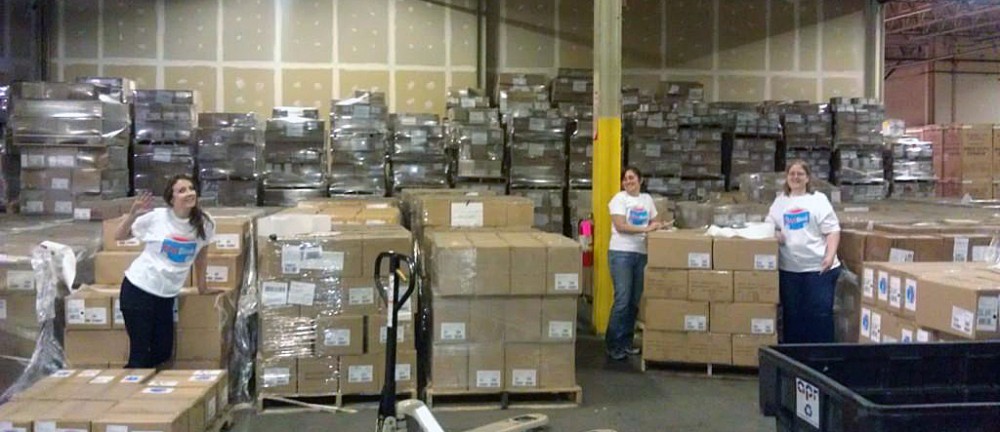 The First Book team just got back from Brattleboro, Vermont, where we distributed 350,000 brand-new books to kids in need. About 100,000 of those books went to local teachers and community leaders, and the rest were shipped out to schools and programs serving kids from low-income families across the country.
The First Book team just got back from Brattleboro, Vermont, where we distributed 350,000 brand-new books to kids in need. About 100,000 of those books went to local teachers and community leaders, and the rest were shipped out to schools and programs serving kids from low-income families across the country.
The books were donated by our friends at Disney Publishing Worldwide, and included quite a few fairy and princess titles.
“There were four of us, and we worked, worked, and worked,” said Katie Niersbach, who led the team in Vermont. “Fairy books are HEAVY.”
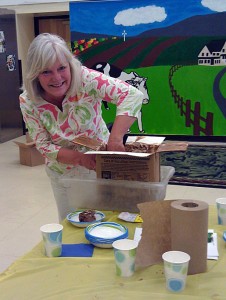 The distribution was made possible thanks to the support of the Vermont Foodbank, who provided warehouse space and volunteers, and also received a large number of books to distribute to the children served by their centers throughout the state.
The distribution was made possible thanks to the support of the Vermont Foodbank, who provided warehouse space and volunteers, and also received a large number of books to distribute to the children served by their centers throughout the state.
Also richly-deserving of our thanks is Carolyn Appleton, a Vermont teacher and community activist who signed up over 80 new programs to help them get books from First Book and fed our staff and volunteers ice cream. (She’s also the mother of one of our staffers, but that only makes us love her more.)
So a big ‘thank you’ to Carolyn and to all our friends at Disney and the Vermont Foodbank, and an even bigger thanks to all the educators – in Vermont and everywhere else – who go the extra mile every day to turn their kids into readers.


By: Brian Minter,
on 4/26/2012
Blog:
First Book
(
Login to Add to MyJacketFlap)
JacketFlap tags:
Montana,
First Book Events,
Teachers,
First Book,
Book Distributions,
Milwaukee,
Volunteers,
First Book Partners,
National Book Bank,
Heather Denny,
Title I schools,
Add a tag
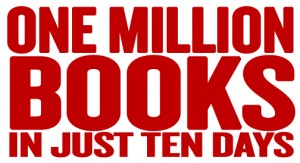 Recently, First Book promised to distribute one million brand-new books to kids in need across the country in just ten days.
Recently, First Book promised to distribute one million brand-new books to kids in need across the country in just ten days.
Those ten days are up, and we are as good as our word. Better, even … altogether we distributed a little over 1.2 million books to the schools and programs in our national network. Woot!
25,000 of those books went to kids at Title I schools across Montana. Heather Denny, a Title I specialist in Montana who was instrumental in helping First Book distribute the books at a statewide conference of Title I teachers, emailed us this morning to tell us how excited her colleagues were.
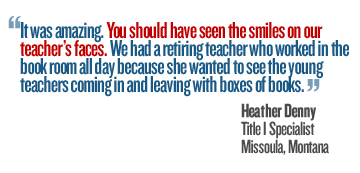 “It was amazing!” she wrote. “You should have seen the smiles on our teacher’s faces. We had a retiring teacher who worked in the book room all day because she wanted to see the young teachers coming in and leaving with boxes of books.”
“It was amazing!” she wrote. “You should have seen the smiles on our teacher’s faces. We had a retiring teacher who worked in the book room all day because she wanted to see the young teachers coming in and leaving with boxes of books.”
If that doesn’t warm your heart, you are made of sterner stuff than we are.
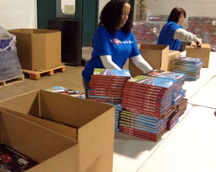 Thanks to everyone who made this possible, from the hard-working volunteers who spent long, tiring days in warehouses to the generous publishers who provided the books to our nonprofit and corporate partners who provide the support needed, and especially to all the teachers and local program leaders who take these books and use them to turn kids into readers.
Thanks to everyone who made this possible, from the hard-working volunteers who spent long, tiring days in warehouses to the generous publishers who provided the books to our nonprofit and corporate partners who provide the support needed, and especially to all the teachers and local program leaders who take these books and use them to turn kids into readers.
Want to get involved in our next amazing book distribution? Click here to sign up for our newsletter and we’ll send you monthly emails sharing stories and letting you know how you can get involved in your community.


Last week First Book distributed close to 1 million books in Seattle, Washington and Minneapolis, Minnesota. This week, we have a team in Milwaukee, Wisconsin distributing 420,000 books to programs and schools that serve kids in need. Of those 420,000 books, more than 100,000 will be distributed locally throughout the Southeastern Wisconsin area.
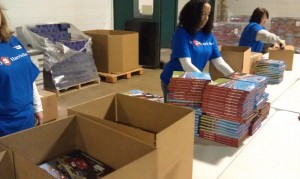
To make this distribution possible, New Threads of Hope is donating warehouse space and assistance with logistics, and M&I employees are serving as volunteers, assisting with the packing, shipping and pick up of books throughout the week.
We are incredibly grateful for all of the volunteers and support that we have had over the past couple of weeks. Thanks to the help of of our many volunteers and partners, we are well on our way to distributing 1.2 million books in just 10 days!
Want to learn more? Click here to sign up for our newsletter and we’ll send you photos, video and information about how you can help get books to kids in need.

View Next 25 Posts
 We considered a volunteer fair for our community for several reasons. First, our library is fortunate to be located in a village that is dedicated to civic service and philanthropy. This event is also a great way for us to target and engage two elusive age groups for us– tweens and teens. Finally, a volunteer fair supports one of our library’s missions: “to act as a responsive resource for lifelong learning.” We hope a successful fair will further strengthen the library’s position as a vital center of the community and create lasting partnerships with local organizations.
We considered a volunteer fair for our community for several reasons. First, our library is fortunate to be located in a village that is dedicated to civic service and philanthropy. This event is also a great way for us to target and engage two elusive age groups for us– tweens and teens. Finally, a volunteer fair supports one of our library’s missions: “to act as a responsive resource for lifelong learning.” We hope a successful fair will further strengthen the library’s position as a vital center of the community and create lasting partnerships with local organizations.





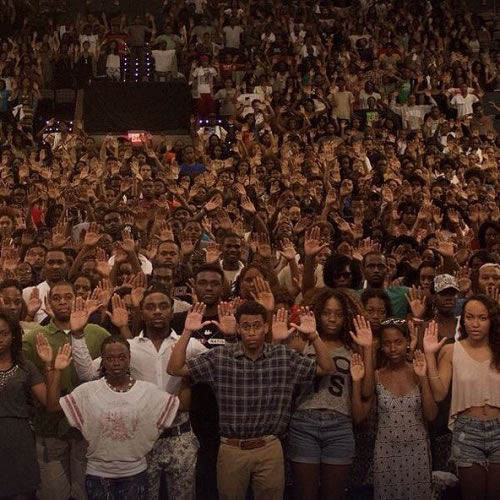

 with a parent, the desire to instill a love of reading in their own kids, wanting to honor a father’s passion for education. It was the first task Joy Brooke, co-chair of First Book’s Seattle volunteer chapter, asked her members to complete.
with a parent, the desire to instill a love of reading in their own kids, wanting to honor a father’s passion for education. It was the first task Joy Brooke, co-chair of First Book’s Seattle volunteer chapter, asked her members to complete. Tess Reiman, a 9th grader who raised funds for First Book to support Habitat for Humanity in Atlantic Beach, Florida. While her brother volunteered building houses with Habitat, Tess saw that many of the children moving into new homes did not have any books to fill their newly constructed rooms.
Tess Reiman, a 9th grader who raised funds for First Book to support Habitat for Humanity in Atlantic Beach, Florida. While her brother volunteered building houses with Habitat, Tess saw that many of the children moving into new homes did not have any books to fill their newly constructed rooms. Seven year old Maguire Brooke loves to read. This year he didn’t want birthday presents. He wanted his friends and family to help him get books to kids in need. With the support of First Book-Seattle he created a
Seven year old Maguire Brooke loves to read. This year he didn’t want birthday presents. He wanted his friends and family to help him get books to kids in need. With the support of First Book-Seattle he created a  Every child from pre-school to 12th grade received 3 to 5 books each. To secure these books, the volunteers fundraised, received in-kind support and connected First Book to local programs and classrooms. There are over 85 K-12 schools located throughout rural Alaska that are not meeting their Academic Yearly Progress (AYP) in more than 4+ years in the area of literacy.
Every child from pre-school to 12th grade received 3 to 5 books each. To secure these books, the volunteers fundraised, received in-kind support and connected First Book to local programs and classrooms. There are over 85 K-12 schools located throughout rural Alaska that are not meeting their Academic Yearly Progress (AYP) in more than 4+ years in the area of literacy. “It is hard to describe the lump I had in my throat when I drove up and saw all the teachers who had come at that early hour, from all over Houston,” said Patricia Gres Shuford, a collegiate member of Pi Beta Phi Fraternity.
“It is hard to describe the lump I had in my throat when I drove up and saw all the teachers who had come at that early hour, from all over Houston,” said Patricia Gres Shuford, a collegiate member of Pi Beta Phi Fraternity. First Book, and longtime partner Pi Beta Phi, also touched the lives of kids in need in Baltimore, Long Beach, Calif. and Nashville, Tenn. In addition to the Fraternity Day of Service book distributions, hundreds of kids joined Pi Phi volunteers to enjoy Dr. Suess®-themed story times, visits from the Cat in the Hat and reading with therapy dogs. Across all four cities, local kids are now reading, learning and loving over 80,000 brand-new books.
First Book, and longtime partner Pi Beta Phi, also touched the lives of kids in need in Baltimore, Long Beach, Calif. and Nashville, Tenn. In addition to the Fraternity Day of Service book distributions, hundreds of kids joined Pi Phi volunteers to enjoy Dr. Suess®-themed story times, visits from the Cat in the Hat and reading with therapy dogs. Across all four cities, local kids are now reading, learning and loving over 80,000 brand-new books.











 Our efforts abroad will strengthen our work domestically. One of our core missions is to bring children here in the United States books and digital content that reflects the full diversity of the world. As we expand the market for books and materials in a range of languages, countries, and cultures, the array of content we can offer in the United States will also grow. More stories will be available to all children.
Our efforts abroad will strengthen our work domestically. One of our core missions is to bring children here in the United States books and digital content that reflects the full diversity of the world. As we expand the market for books and materials in a range of languages, countries, and cultures, the array of content we can offer in the United States will also grow. More stories will be available to all children.









 The First Book team just got back from Brattleboro, Vermont, where we distributed 350,000 brand-new books to kids in need. About 100,000 of those books went to local teachers and community leaders, and the rest were shipped out to schools and programs serving kids from low-income families across the country.
The First Book team just got back from Brattleboro, Vermont, where we distributed 350,000 brand-new books to kids in need. About 100,000 of those books went to local teachers and community leaders, and the rest were shipped out to schools and programs serving kids from low-income families across the country. The distribution was made possible thanks to the support of the
The distribution was made possible thanks to the support of the  Recently, First Book
Recently, First Book  “It was amazing!” she wrote. “You should have seen the smiles on our teacher’s faces. We had a retiring teacher who worked in the book room all day because she wanted to see the young teachers coming in and leaving with boxes of books.”
“It was amazing!” she wrote. “You should have seen the smiles on our teacher’s faces. We had a retiring teacher who worked in the book room all day because she wanted to see the young teachers coming in and leaving with boxes of books.” Thanks to everyone who made this possible, from the hard-working volunteers who spent long, tiring days in warehouses to the generous publishers who provided the books to our nonprofit and corporate partners who provide the support needed, and especially to all the teachers and local program leaders who take these books and use them to turn kids into readers.
Thanks to everyone who made this possible, from the hard-working volunteers who spent long, tiring days in warehouses to the generous publishers who provided the books to our nonprofit and corporate partners who provide the support needed, and especially to all the teachers and local program leaders who take these books and use them to turn kids into readers. 
[…] Beat – Baseball, Comic-Cons, and Paying Volunteers – This issue […]